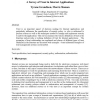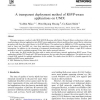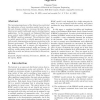105
click to vote
COMSUR
2000
15 years 1 months ago
2000
Trust is an important aspect of decision making for Internet applications and particularly influences the specification of security policy i.e. who is authorised to perform action...
CN
2002
15 years 1 months ago
2002
This paper proposes a method, called RLR (RSVP (Resource reSerVation Protocol) library redirection), which can transform legacy Internet applications into RSVP-aware applications ...
109
click to vote
IJNSEC
2006
15 years 2 months ago
2006
The increasing importance of the Internet has motivated the exploration of new execution models based on mobile and dynamic entities to overcome the limits of the client/server mo...
CN
2007
15 years 2 months ago
2007
Internet applications, such as Email, VoIP and WWW, have been enhanced with
126
click to vote
ESAW
2000
Springer
15 years 5 months ago
2000
Springer
The design and development of Internet applications can take advantage of a paradigm based on autonomous and mobile agents. However, agent mobility introduces peculiar coordinatio...
103
click to vote
DATE
2002
IEEE
15 years 7 months ago
2002
IEEE
The structure of Internet applications and scenarios is changing rapidly today. This offers new potential for established technologies and methods to expand their area of applicat...
100
click to vote
FATES
2003
Springer
15 years 7 months ago
2003
Springer
Abstract. We adapt and extend the theories used in the general framework of automated software testing in such a way that they become suitable for black-box conformance testing of ...
128
click to vote
DASFAA
2003
IEEE
15 years 7 months ago
2003
IEEE
Peer-to-peer (P2P) technology can be naturally integrated with mobile agent technology in Internet applications, taking advantage of the autonomy, mobility, and efficiency of mobi...
123
click to vote
TELETRAFFIC
2007
Springer
15 years 8 months ago
2007
Springer
Many Internet applications employ multi-tier software architectures. The performance of such multi-tier Internet applications is typically measured by the end-toend response times...
123
click to vote
KIVS
2009
Springer
15 years 8 months ago
2009
Springer
Multiplayer Online Games (MOGs) are a thriving market leading to a multiplicity of game related internet applications. Enabling information exchange between games and these applica...



